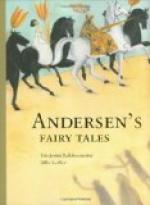The poisonous flies and gnats swarmed around by thousands; in vain one waved myrtle-branches about like mad; the audacious insect population did not cease to sting; nor was there a single person in the well-crammed carriage whose face was not swollen and sore from their ravenous bites. The poor horses, tortured almost to death, suffered most from this truly Egyptian plague; the flies alighted upon them in large disgusting swarms; and if the coachman got down and scraped them off, hardly a minute elapsed before they were there again. The sun now set: a freezing cold, though of short duration pervaded the whole creation; it was like a horrid gust coming from a burial-vault on a warm summer’s day—but all around the mountains retained that wonderful green tone which we see in some old pictures, and which, should we not have seen a similar play of color in the South, we declare at once to be unnatural. It was a glorious prospect; but the stomach was empty, the body tired; all that the heart cared and longed for was good night-quarters; yet how would they be? For these one looked much more anxiously than for the charms of nature, which every where were so profusely displayed.
The road led through an olive-grove, and here the solitary inn was situated. Ten or twelve crippled-beggars had encamped outside. The healthiest of them resembled, to use an expression of Marryat’s, “Hunger’s eldest son when he had come of age”; the others were either blind, had withered legs and crept about on their hands, or withered arms and fingerless hands. It was the most wretched misery, dragged from among the filthiest rags. “Excellenza, miserabili!” sighed they, thrusting forth their deformed limbs to view. Even the hostess, with bare feet, uncombed hair, and dressed in a garment of doubtful color, received the guests grumblingly. The doors were fastened with a loop of string; the floor of the rooms presented a stone paving half torn up; bats fluttered wildly about the ceiling; and as to the smell therein—no—that was beyond description.
“You had better lay the cloth below in the stable,” said one of the travellers; “there, at all events, one knows what one is breathing.”
The windows were quickly opened, to let in a little fresh air. Quicker, however, than the breeze, the withered, sallow arms of the beggars were thrust in, accompanied by the eternal whine of “Miserabili, miserabili, excellenza!” On the walls were displayed innumerable inscriptions, written in nearly every language of Europe, some in verse, some in prose, most of them not very laudatory of “bella Italia.”
The meal was served. It consisted of a soup of salted water, seasoned with pepper and rancid oil. The last ingredient played a very prominent part in the salad; stale eggs and roasted cocks’-combs furnished the grand dish of the repast; the wine even was not without a disgusting taste—it was like a medicinal draught.
At night the boxes and other effects of the passengers were placed against the rickety doors. One of the travellers kept watch while the others slept. The sentry was our young Divine. How close it was in the chamber! The heat oppressive to suffocation—the gnats hummed and stung unceasingly—the “miserabili” without whined and moaned in their sleep.




